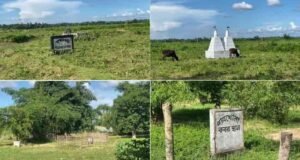
Hunters are indiscriminately killing and catching birds every day in the country’s largest ‘Hakaluki Haor’, which has spread in Sylhet and Moulvibazar district, ignoring government ban.
Birds in well-known Hail Haor and Baikka Beel in Moulvibazar district have also fallen victims to hunting.
Hunters usually use poison traps and set traps to kill birds.
Hunting of birds in this way is posing a serious threat to nature and biodiversity.
Catching birds illegally, often some organised groups are selling those during the winter season at different places in Moulcibazar and Sylhet districts, locals said.
Each bird is at Tk 200 to Tk 1000.
Some hotelliers also sell the birds at different upazilas of Sylhet region like Jaintapur, Srimangal, Fenchuganj, Moulvibazar, etc, alleged a number of environment activists.
Even some years ago, birds of rare species from different parts of the world used to come to the Hakaluki haor and other haors and beels in the region during winter. As the birds are not safe in the country, the arrival and the number of migratory birds have declined in the recent years, they said.
General Secretary of the Bangladesh Poribesh Andolan (BAPA), Sylhet Chapter Abdul Karim, said the demand for protecting birds in the Hakaluki Hakaluki haor was raised, but the authorities concerned paid no heed to it.
The government should take immediate measures to protect bird sanctuaries, its natural habitat and ecology in the Hakaluki haor from frequent movement of the tourists and visitors, he opined.
A number of senior citizens like Aftab Uddin of Fenchuganj said in the past there was hunting on a limited scale. But it is now rampant.
But, the steps by the local administration are not sufficient. Recently a mobile court detained a bird hunter in Srimangal upazila and fined him Tk 3,000.
An official at the Wildlife Management Nature Conservation department said regular drives are being conducted to stop bird hunting through mobile court and other initiatives.
The government declared the Hakaluki Haor as Ecologically Critical Area (ECA) in 1999.
 Weekly Bangla Mirror | Bangla Mirror, Bangladeshi news in UK, bangla mirror news
Weekly Bangla Mirror | Bangla Mirror, Bangladeshi news in UK, bangla mirror news







